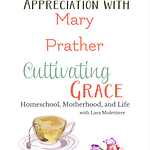Children are not born bad but with possibilities for good and for evil.
Now that we’ve discussed Charlotte Mason’s Principle 1: Children are Born Persons, let’s dive deep Charlotte Mason's Principle 2: Children have a Will to be Good or Bad.
Charlotte Mason's Principle 2: Good & Evil Nature of a Child
Children are not born bad but with possibilities for good and for evil.
When you first read this statement, it appears to go against Christian principles. What about the sin nature that Adam and Eve passed down? Aren’t we all sinners with the likelihood to be bad? Yes, but this statement is actually referring to choices.
If you would continue to read the context and remember the time period, it makes much more sense! It's kind of like the Bible -- some of the stories seem unbelievable until you study the Jewish culture, then it makes sense!
During this time period, the theory of evolution and defective genes was rearing its ugly head and causing confusion amongst parents.
Yet, children are not born as a blank piece of paper, they have choices. They have a will to make the right one. We, as parents and teachers, can teach and train our children to make good decisions.
Of course, the flesh is weak and can take over quickly without any proper guidance. But, that’s what our job is -- to instill good character traits and habits using loving corrections.
Education is a Vessel for Knowledge
Now let’s discuss how education plays into good and evil. While education alone is not the answer for godly decisions, it’s a vessel to fill the mind with truth and knowledge. The Bible is the perfect place to start -- the infallible word! Then, our heart can be nurtured to accept these truths and convince the will to make the right choice.
As the Bible teaches, “Train up a child in the way they should go, and they will not depart from it”. An important part of training is teaching habit forming techniques.
Charlotte Mason school follows these same principles with encouraging great habit skills. She stated quite rightly, “The mother who takes pains to endow her children with good habits secures for herself smooth and easy days.”
Keep in mind, we cannot do anything good apart from Jesus Christ and that’s why the Holy Spirit is our guide. So rely on Him to give you comfort and guidance as you nurture your children’s daily rituals.
Habit Training Practical Tips
Now that we have filled our minds with knowledge on why we should train a child, let’s discuss how to teach the right habits with a real-life example. We’ll take it right out of Charlotte Mason’s playbook.
In Volume 1, page 122, Charlotte Mason reading gives us an example on how you can be successful at training your child with a simple task -- like shutting the door when entering or leaving a room. You will be surprised at how fast they learn if you as their teacher, perform the training in a mindful manner.
Training the Trainer
In other words, we, as their loving instructors, must train ourselves first! Follow three steps before you incorporate any habit training exercise:
Tact - Keep an eye on the right moment to begin training.
Watchfulness - continue watching your child as they walk through a new process.
Persistence - be consistent with encouraging this new habit-forming routine with precision.
Charlotte Mason: The Formation of a Habit Part 1
Let’s first read Charlotte Mason’s practical example in Volume 1, page 122:
'Johnny,' she says, in a bright, friendly voice, 'I want you to remember something with all your might: never go into or out of a room in which anybody is sitting without shutting the door.'
'But if I forget, mother?'
'I will try to remind you.'
'But perhaps I shall be in a great hurry.'
'You must always make time to do that.'
'But why, mother?'
'Because it is not polite to the people in the room to make them uncomfortable.'
'But if I am going out again that very minute?'
'Still, shut the door, when you come in; you can open it again to go out. Do you think you can remember?'
'I'll try, mother.'
Charlotte Mason: The Formation of a Habit Part 2
'Very well; I shall watch to see how few "forgets" you make.'
For two or three times Johnny remembers; and then, he is off like a shot and half-way downstairs before his mother has time to call him back. She does not cry out, 'Johnny, come back and shut the door!' because she knows that a summons of that kind is exasperating to big or little.
She goes to the door, and calls pleasantly, 'Johnny!' Johnny has forgotten all about the door; he wonders what his mother wants, and, stirred by curiosity, comes back, to find her seated and employed as before. She looks up, glances at the door, and says, 'I said I should try to remind you.' 'Oh, I forgot,' says Johnny, put upon his honour; and he shuts the door that time, and the next, and the next.
Now, remember, there will be a time your child will forget or test the habit. Please note, you must NOT let one habit-forming routine slide. Wait for a moment to see if they come back on their own volition.
Important note: you must call the child back to redeem themselves when skipping a step. Otherwise, it is a critical mistake and training will need to start over again. The habit has now formed into a bad habit.
The Correct Habit Forming Approach
If you may notice, the mother in this instance uses a gentle approach. When he initially leaves the door open, she doesn’t yell, criticize, or demean his actions. Instead, she gives him a gentle but firm command and backs him up with encouragement by helping him remember.
It’s the hardest part of the training, taking the time out of our busy day to begin a new good habit. But, with prayer and these three key principles, we will cultivate lifetime habits in our children.
Yes, there is good and evil nature in each child, but let’s nurture the good nature in our child, one good habit at a time.
















Share this post